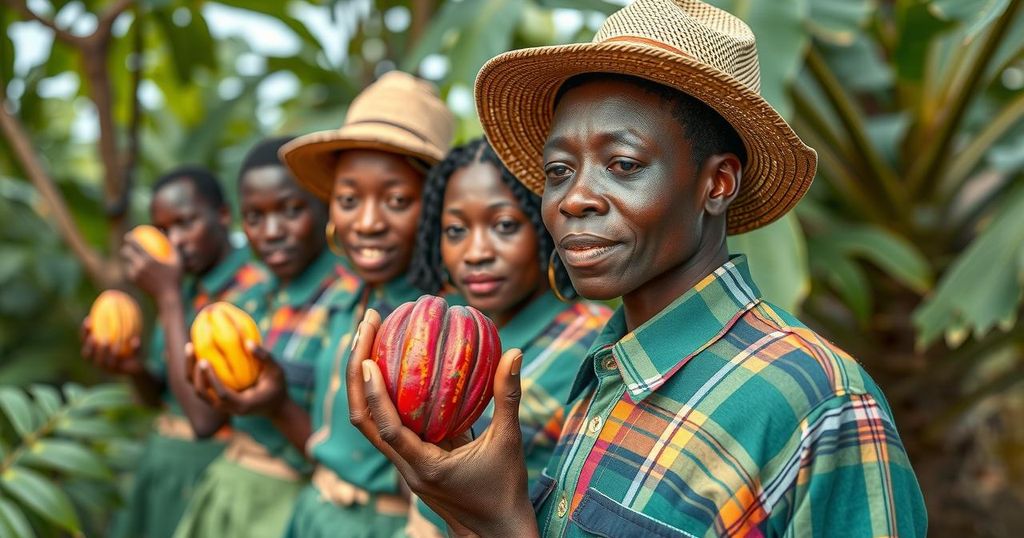Cocoa farmers in Ghana face significant challenges as climate change disrupts production through increased pests and unpredictable weather, leading to declining yields. This situation puts over one million farmers at risk and threatens the local economy that heavily relies on cocoa exports. With soaring prices and strained supply chains, there is an urgent call for government intervention and sustainable practices to protect this critical agricultural sector as Ghana approaches its presidential elections.
Farmers in Ghana are expressing urgent concerns about the adverse impacts of climate change on cocoa production, which is vital to the country’s economy and global chocolate industry. Currently, more than 400,000 tons have been lost due to erratic weather patterns, pests, and diseases such as black pod and swollen shoot virus, halving typical yields. With agriculture being Ghana’s largest employer, this drop threatens the livelihoods of over one million cocoa farmers. The Ghanaian cedi’s depreciation further exacerbates farmers’ challenges, inflating costs of supplies and production. The immediate response from government and private sectors is deemed crucial to address these issues and implement sustainable farming practices.
As Ghana plays a critical role as the world’s second-largest cocoa exporter alongside Ivory Coast, the agricultural sector is essential to the nation’s economy. Cocoa farming significantly contributes to Ghana’s GDP and supports a vast employment network. However, climatic disruptions, particularly increased temperature variability and altered rainfall patterns, threaten the delicate conditions cocoa trees require for healthy growth. The pressing need for intervention from government and community organizations becomes evident as farmers like Kate Buadu and Akua Donkor recount their struggles with declining harvests and increasing production costs.
Despite efforts by some organizations to promote eco-friendly practices and support farmers in climate adaptation, challenges remain. The urgent plea from economists and farming leaders is for policymakers to prioritize assistance and create a sustainable framework that couples agricultural productivity with environmental conservation. As Ghana approaches its presidential election, the candidates’ commitments to addressing these climatic challenges are under scrutiny from anxious farmers awaiting decisive action for their futures and that of the cocoa industry.
Farmers report severe crop damage due to rising pest populations, pushing them toward alternative crops, thereby impacting cocoa merchants’ supply chains. Consequently, chocolate producers face soaring prices for cocoa beans and must pass these costs to consumers, leading to higher chocolate prices. The situation underscores the interconnectedness of environmental health and agricultural success, necessitating immediate and strategic responses from both political leaders and the private sector to preserve Ghana’s cocoa heritage.
Ghana, as the world’s second-largest cocoa producer, significantly impacts the global chocolate market. It supplies over 60% of the world’s cocoa, making it crucial for both the local economy and the international chocolate industry. The article highlights the complex relationship between agricultural practices and climate change, focusing on challenges faced by cocoa farmers, such as pest outbreaks and falling yields due to changing weather patterns. With agriculture employing a significant portion of the population, the decline in cocoa production poses a serious threat to local livelihoods and economic stability. Immediate government action and sustainable practices are needed to adapt to these changes and protect the vital cocoa sector.
In conclusion, Ghanaian cocoa farmers are grappling with the severe effects of climate change, including reduced yields and increased pest populations, which severely impact their livelihoods and the economy at large. The situation demands urgent policy interventions and the implementation of sustainable agricultural practices while addressing the fluctuating market dynamics. As the country prepares for an upcoming presidential election, the responses from candidates regarding climate adaptation strategies for cocoa farming will be closely monitored by those whose futures depend on the cocoa industry. It is imperative that the government and private sector collaborate to develop effective solutions that safeguard the environment and the vital cocoa sector.
Original Source: theworld.org






